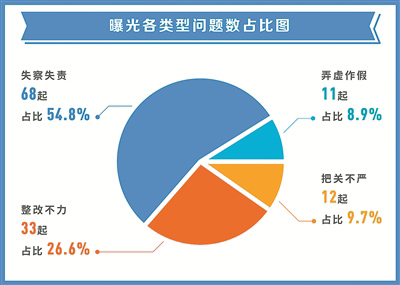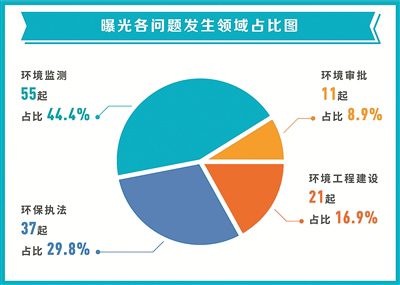More than 100 formalistic bureaucratic problems in the field of ecological environmental protection have been exposed.
CCTV News:Formalism and bureaucracy in ecological environmental protection seriously deviate from the decision-making and deployment of the CPC Central Committee, infringe on the vital interests of the masses and restrict the sustainable development of economy and society. According to statistics, since the 19th National Congress of the Communist Party of China, the website of the State Supervision Commission of the Central Commission for Discipline Inspection has publicly exposed 124 typical cases of formalism and bureaucracy in the field of ecological environmental protection, handling 482 people.
Judging from the types of problems, formalism and bureaucracy in the field of eco-environmental protection mainly focus on four aspects: negligence, ineffective rectification, lax control and fraud.

There were 68 cases of negligence and dereliction of duty, accounting for 54.8%. Some public officials are lax and untrue in their work style, and neglect to supervise and investigate environmental problems in their respective fields. Such problems are common manifestations of formalism and bureaucracy in the field of ecological environmental protection. For example, from December 2017 to July 2018, Deng Guoliang, director of the Economic Development Zone Branch of Ningxiang Environmental Protection Bureau in Changsha City, Hunan Province, led a team to the sewage treatment plant in the Economic Development Zone for many times to conduct on-site monitoring, and failed to stop the illegal trial operation of the plant without building an emergency pump and an emergency accident pool. It was not found that the biological pool of the plant stored a large amount of activated sludge, and the form was filled out to confirm that it was normal without confirming whether the relevant places and equipment were in normal operation, resulting in sewage overflow and sewage discharge accidents. Deng Guoliang was punished by government affairs.
There are 33 problems of poor rectification, accounting for 26.6% of all problems. In recent years, through environmental supervision, special inspections and other means, a number of outstanding problems that damage the ecological environment have been discovered in various places, but some public officials dare not touch the real thing in the rectification, which has delayed the solution of the problem. For example, in 2017, the Central Environmental Protection Inspector Group ordered the town government to organize forces to restore the original state to the beach contractor in Chongshou Town, Cixi City, Zhejiang Province. However, Qian Jianju, as the deputy mayor in charge of agriculture and the deputy director of the town’s "beach-length system" leading group, failed to complete the rectification task on time until September 2018, which caused adverse effects. In October 2018, Qian Jianju was punished by warnings within the party.
There were 12 cases of lax control, accounting for 9.7%. Judging from the notification problem, some public officials failed to fulfill their duties in the approval and issuance of documents such as sewage permits, allowing unqualified enterprises to pass the approval and pollute the environment. For example, in October, 2015, Zeng Yubo, director of the Law Enforcement Supervision Department of Environmental Water Affairs Bureau of Nansha Development Zone, Guangzhou, was responsible for the approval and issuance of pollutant discharge permits. Knowing that Nansha District Government had ordered a company to close its pipe pile manufacturing facilities in the first-class protection zone of drinking water sources, he did not correctly implement the administrative decision of the district government, and unilaterally thought that the district government had not ordered the company to dismantle or close its facilities in the second-class protection zone of drinking water sources, and continued to issue pollutant discharge permits valid for one year to the company. In December 2018, Zeng Yubo was punished.
There were 11 cases of fraud, accounting for 8.9%. For example, the relevant industry authorities in Xingren City, Southwest Guizhou Province knew that Jinxing Gold Mining had problems such as excessive stacking of tailings ponds and excessive discharge of pollutants, but did not carry out substantive supervision work and falsely reported the rectification situation when the rectification task was not completed. In January 2019, Cen Zhaohai, director of Xingren Environmental Protection Bureau, was punished by government affairs warning, and Cheng Rui, deputy stationmaster of environmental monitoring station, was punished by the party; Yuan Dajiang, a member of the party group and deputy director of the Southwest Guizhou Industrial and Information Committee, was admonished.
From the field of problems, formalism and bureaucracy in environmental protection mainly occur in environmental approval, environmental monitoring, environmental law enforcement and environmental engineering construction. Among them, 55 cases occurred in the field of environmental monitoring, accounting for 44.4%; 37 cases occurred in the field of environmental law enforcement, accounting for 29.8%; 21 cases occurred in environmental engineering construction, accounting for 16.9%; 11 cases occurred in the field of environmental approval, accounting for 8.9%.

With the deepening of the reform of the ecological civilization system, through the establishment of a comprehensive law enforcement team, covering all areas of ecological environmental protection, the investment in ecological environmental engineering construction has been increasing, but the problems of poor work deployment, lax and untrue measures, high attitude and low implementation can not be ignored. In this regard, we must pay close attention to the key areas where these problems are prone to occur frequently, adhere to both the symptoms and the root causes, and put the responsibilities in place.
Among the 482 party member cadres notified for investigation, there are 294 at the township level and below, accounting for 61%; 102 people at the county level, accounting for 21.1%; There are 38 people at the bureau level, accounting for 7.9%; There are 48 village cadres and staff of enterprises and institutions, accounting for 10%.
Judging from the notified cases, among the party member cadres investigated, there are not only the main leaders of local party organizations, but also party member cadres from functional departments such as Land and Resources Bureau, Environmental Protection Bureau and Water Affairs Bureau; There are both public officials responsible for supervision and inspection and party member cadres responsible for checking and approving; There are not only party and government leaders, but also relevant leaders of state-owned enterprises and village cadres. At the same time, it has become the norm to investigate more than one case. A formalism and bureaucracy problem in the field of ecological and environmental protection will be investigated and dealt with, not only the directly responsible person, but also the direct leader, the leader in charge and even the leader who has been transferred from the original post will be held accountable.
It is a major task for the discipline inspection and supervision organs to provide a strong discipline guarantee for the fight against pollution. Discipline inspection and supervision organs at all levels should base themselves on their functions and responsibilities, strengthen supervision and inspection, urge party committees and governments at all levels to conscientiously implement the major decision-making arrangements of the CPC Central Committee, and not take responsibility for inaction, formalism, bureaucratic stubborn diseases and outstanding problems in the field of ecological and environmental protection, and find that they are investigated together, and timely report and expose typical problems, and guard green mountains and green rivers with iron discipline. (CCTV reporter Wang Li)
(Editor: Yin Huixian)